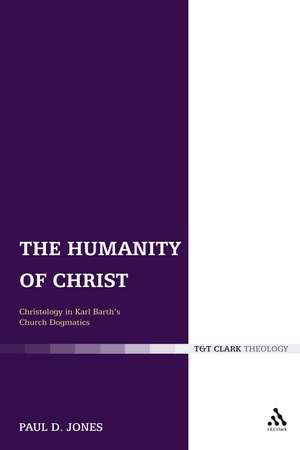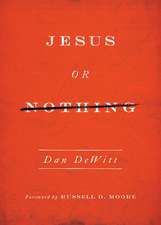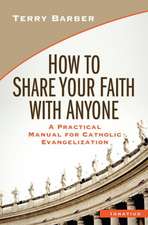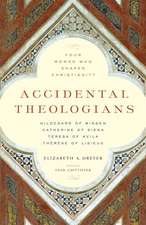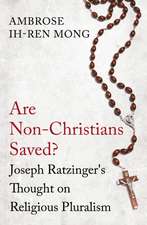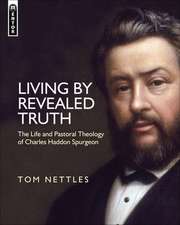The Humanity of Christ: Christology in Karl Barth's Church Dogmatics
Autor Dr Paul Dafydd Jonesen Limba Engleză Paperback – 27 iul 2011
| Toate formatele și edițiile | Preț | Express |
|---|---|---|
| Paperback (1) | 258.89 lei 6-8 săpt. | |
| Bloomsbury Publishing – 27 iul 2011 | 258.89 lei 6-8 săpt. | |
| Hardback (1) | 892.09 lei 6-8 săpt. | |
| Bloomsbury Publishing – 31 aug 2008 | 892.09 lei 6-8 săpt. |
Preț: 258.89 lei
Preț vechi: 331.91 lei
-22% Nou
Puncte Express: 388
Preț estimativ în valută:
49.55€ • 51.53$ • 40.90£
49.55€ • 51.53$ • 40.90£
Carte tipărită la comandă
Livrare economică 15-29 aprilie
Preluare comenzi: 021 569.72.76
Specificații
ISBN-13: 9780567012005
ISBN-10: 056701200X
Pagini: 304
Dimensiuni: 156 x 234 x 16 mm
Greutate: 0.43 kg
Editura: Bloomsbury Publishing
Colecția T&T Clark
Locul publicării:London, United Kingdom
ISBN-10: 056701200X
Pagini: 304
Dimensiuni: 156 x 234 x 16 mm
Greutate: 0.43 kg
Editura: Bloomsbury Publishing
Colecția T&T Clark
Locul publicării:London, United Kingdom
Caracteristici
Brings together systematic theology, ethics and political theology.
Notă biografică
Paul Dafydd Jones is Assistant Professor of Western Religious Thought in the Department of Religious Studies at the University of Virginia. He holds degrees from Oxford University (M.A.), Harvard Divinity School (M.Div.), and Harvard University (A.M., Ph.D.).
Cuprins
IntroductionChapter One: Approaching Barth's Christology I: The anhypostasis/enhypostasis pairing II: Barth and the Definition of Chalcedon III: Early moves IV: Christology and the "historical Jesus"Chapter Two: Election and ChristologyI: Divine self-determination(a) The relationship between Church Dogmatics I and II(b) "God is," means, "God loves"(c) Jesus Christ, "electing God" and "elected human" II: Jesus' covenantal humanity(a) Encounter(b) Decision(c) History III: Summary remarksChapter Three: Jesus Christ, Embodiment of GraceI: Christology after Church Dogmatics II.2II: Christology in critical conversation with Protestant Orthodoxy(a) Election reprised(b) The unio hypostatica; anhypostasis/enhypostasis revisited; the communio naturarum(c) Permutations of the communicatio idiomatum(d) Summary remarks; the genus tapeinoticum III: Jesus Christ, the "königliche Mensch"(a) "Correspondence": the form of Jesus' life(b) "Correspondence" as wholeheartedness, sovereignty, love, and deliverance(c) Agency and freedom; Jesus and revolution IV: Exaltation and ExinanitionChapter Four: Obedience unto Death: Achieving the Salvation of the WorldI: HistoryII: The obedience of Christ: Christology in light of the passion(a) The obedience of the Son of God(b) The obedience of Jesus of NazarethIII: Gethsemane(a) Jesus' history: a movement towards crisis(b) The achievement of justificatory responsibility(c) The consequences of Jesus' struggle (d) Justification enacted IV: Beyond tragedyChapter Five: Looking back, looking forwardI: Summary remarks(a) Reviewing the argument(b) Unanswered questions(c) Potential problemsII: Barth's Christology todayAppendix One: The Organization of Church Dogmatics IVAppendix Two: Barth and the genus maiestaticum Bibliography
Recenzii
An outstanding contribution to Barth scholarship. This book certainly is among the best studies of Barth's theology of the last years. It can be recommended to anyone interested in theology. A must for Barth scholars.
In this well-researched book, Edward Short shows how Newman, far from being the self-absorbed introvert as some have claimed, had a wide circle of friends who benefited from his extraordinary powers of empathy. Newman and his Contemporaries is a useful introduction to this essential quality of the man and will send readers back not only to Newman's published works but to his wonderful letters.
In this well-researched book, Edward Short shows how Newman, far from being the self-absorbed introvert as some have claimed, had a wide circle of friends who benefited from his extraordinary powers of empathy. Newman and his Contemporaries is a useful introduction to this essential quality of the man and will send readers back not only to Newman's published works but to his wonderful letters.
